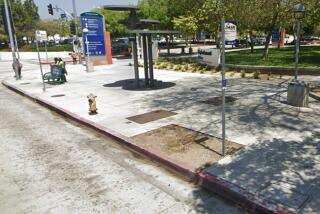Think of the Riders -- Resolve Transit Strike
- Share via
Re “Bus Stop,” Opinion, Nov. 2: A pox on both their houses. Neil Silver (for the union) and Zev Yaroslavsky (for the Metropolitan Transportation Authority) each makes his case in detail for his own side of the dispute. Aside from a passing few tears for the inconvenienced 400,000 daily passengers, they totally disregard them. Yet it is this third party to the strike who will later pay for the increased costs of the eventual settlement.
Here is a simple two-step plan to resolve the strike: First, the mechanics union and the MTA accept a 5% across-the-board payroll reduction. Everyone, top to bottom. Then, the bus fare is reduced by 25% (rounded off to the nearest quarter). This would produce the greatest good for the greatest number of people in Los Angeles.
Irv Justman
Los Angeles
*
I don’t usually agree with Yaroslavsky, but he is right on about the MTA strike. I am a retired deputy sheriff with 31 years of service. I have a nice retirement, but not close to the transit mechanics’. It’s time for them to pick up some of their medical insurance and maybe forgo a raise for a year or so.
The MTA always seems to bargain in bad faith. What about low-income riders?
Leonard Gawlik
Buena Park
*
Clearly, the MTA and mechanics union are at an impasse, but at least the union has suggested what bus riders need: that the mechanics return to work if the MTA will agree to binding arbitration.
If, as Yaroslavsky writes, “the board is resolved to break out of a damaging cycle in which, each time a contract comes up, the union strikes -- and the board, under pressure, agrees to more than it can afford,” why doesn’t it accept some form of arbitration that public transit systems in Chicago, Boston, Washington and Atlanta have accepted, precisely to avoid the havoc of strikes (editorial, Oct. 30)? Why is it that the MTA can’t afford what the mechanics are asking but it can afford big salaries plus perks for its executives? No concern there for taxpayer dollars.
Yaroslavsky ends by stating the obvious: “No one wins in a strike. There are only losers. The sooner all parties realize this, the sooner the buses will roll.” Bus riders, the biggest losers, realize this. The question is, does “all parties” include the MTA? By not pressuring for a resolution to this debilitating strike, Mayor James Hahn and the City Council are part of the problem.
Damiana Chavez
Los Angeles
*
A reader’s suggestion for freezing the salaries of management during labor disputes doesn’t go far enough (Oct. 31). I suggest the loss of salaries of everyone at the negotiating table during talks, and that would include union leaders. That should speed up a resolution.
Robert H. Congelliere
San Pedro
More to Read
Sign up for Essential California
The most important California stories and recommendations in your inbox every morning.
You may occasionally receive promotional content from the Los Angeles Times.













